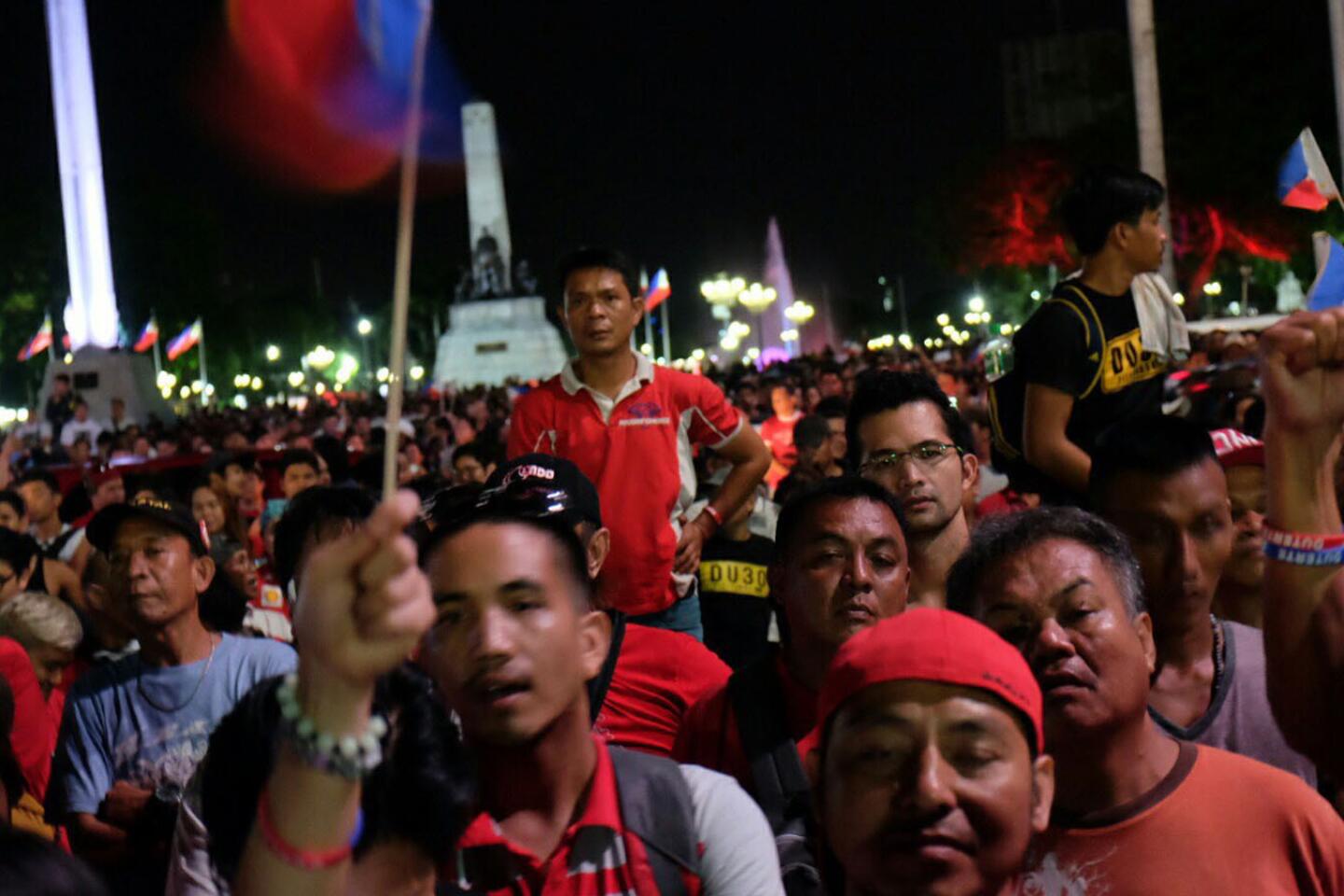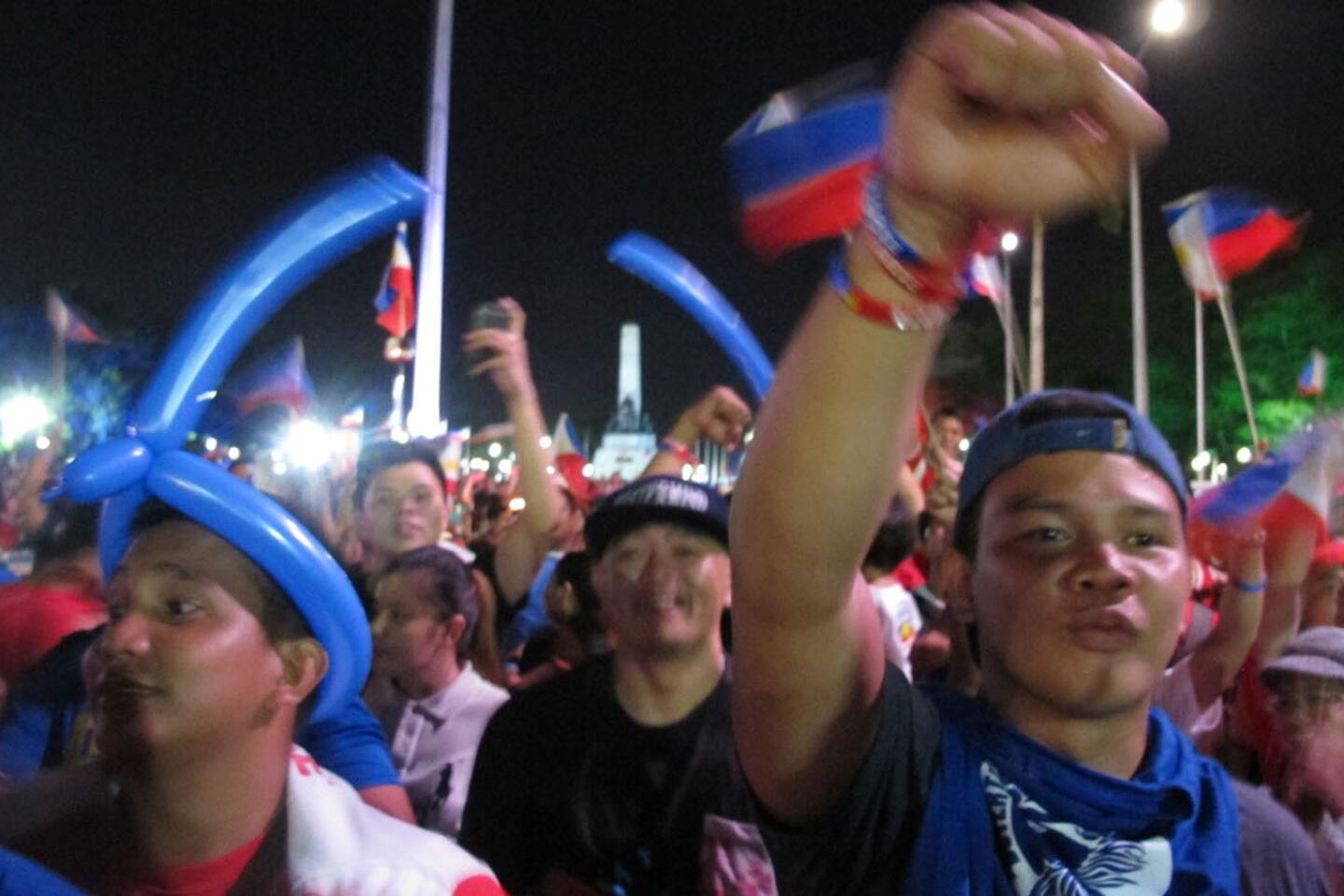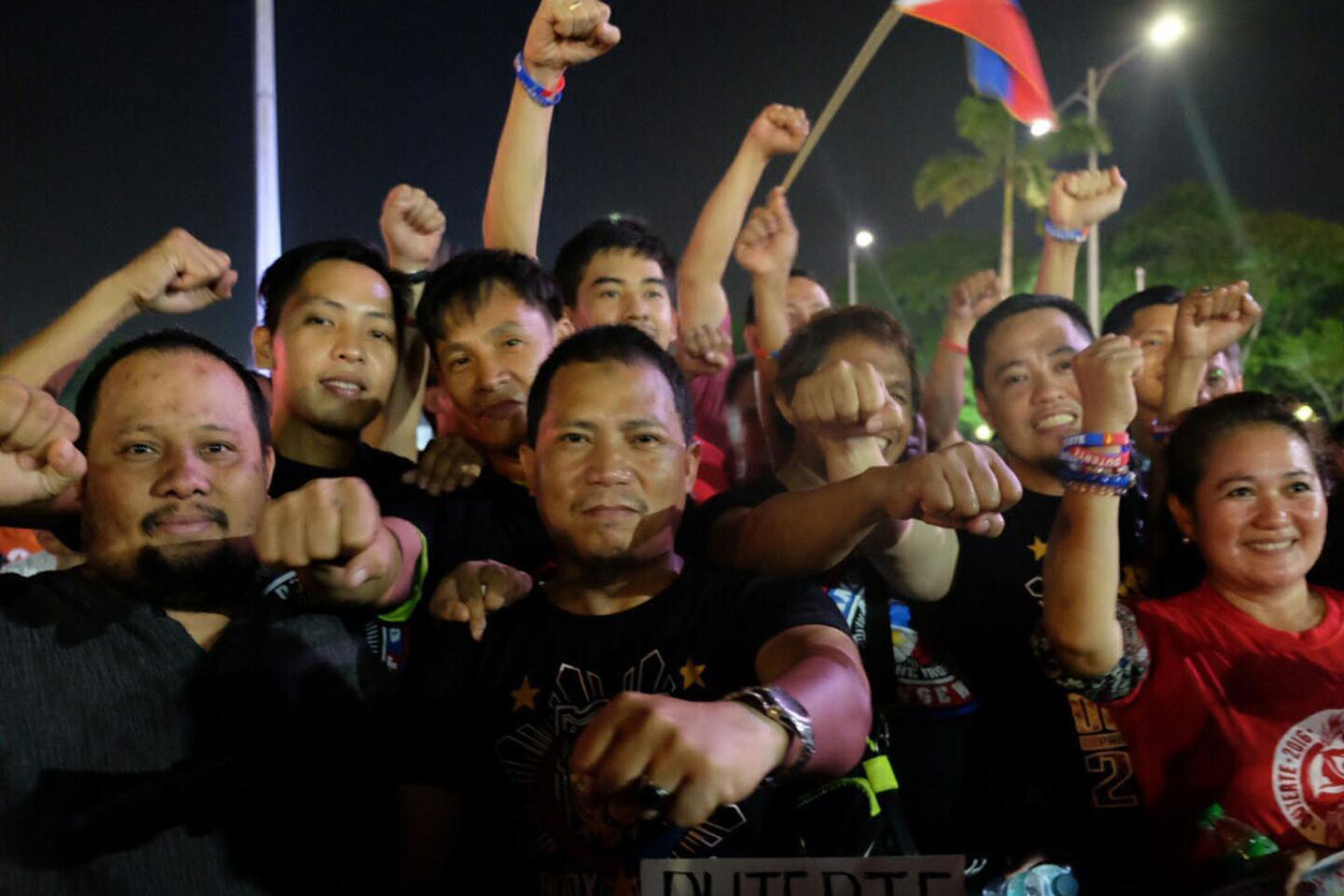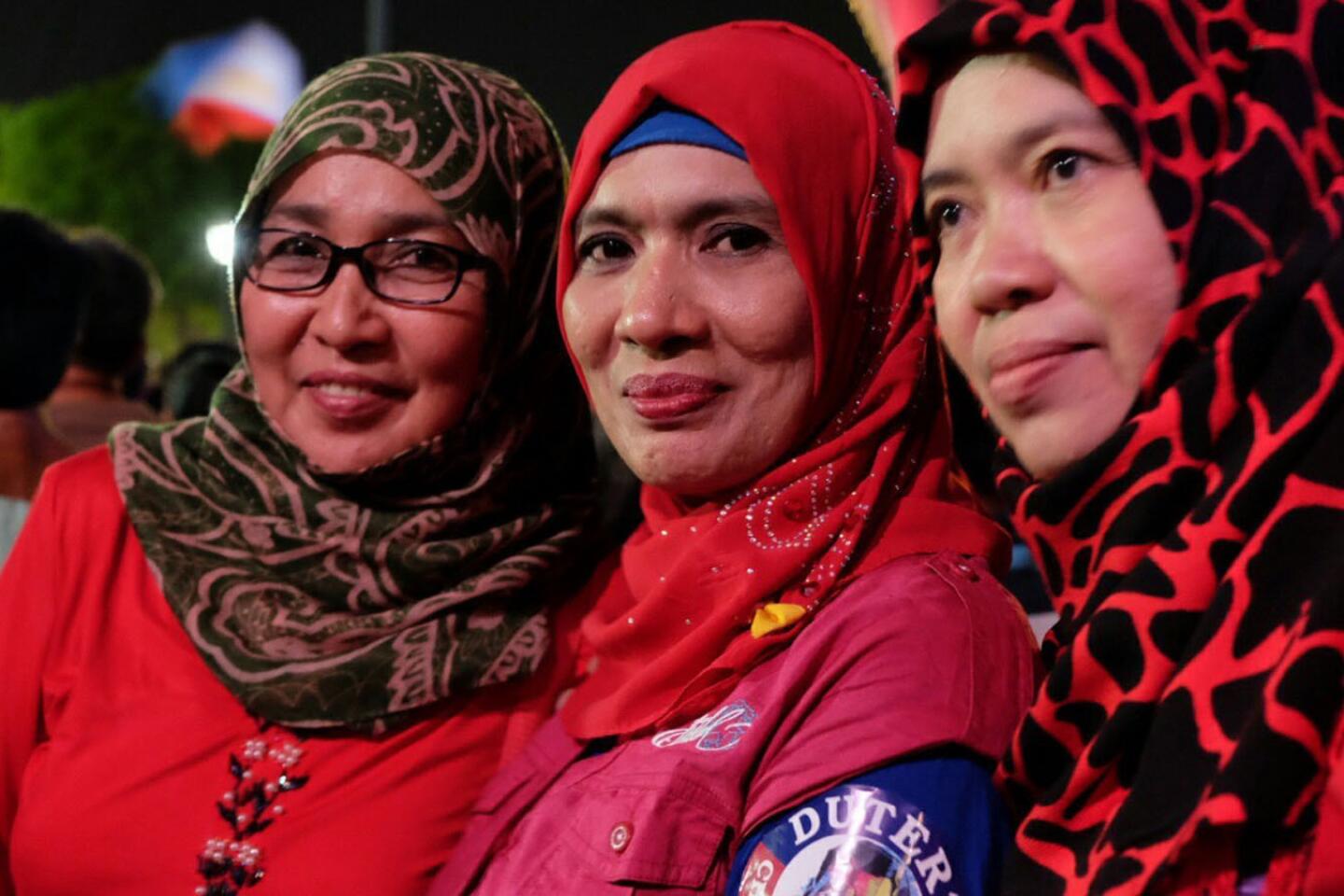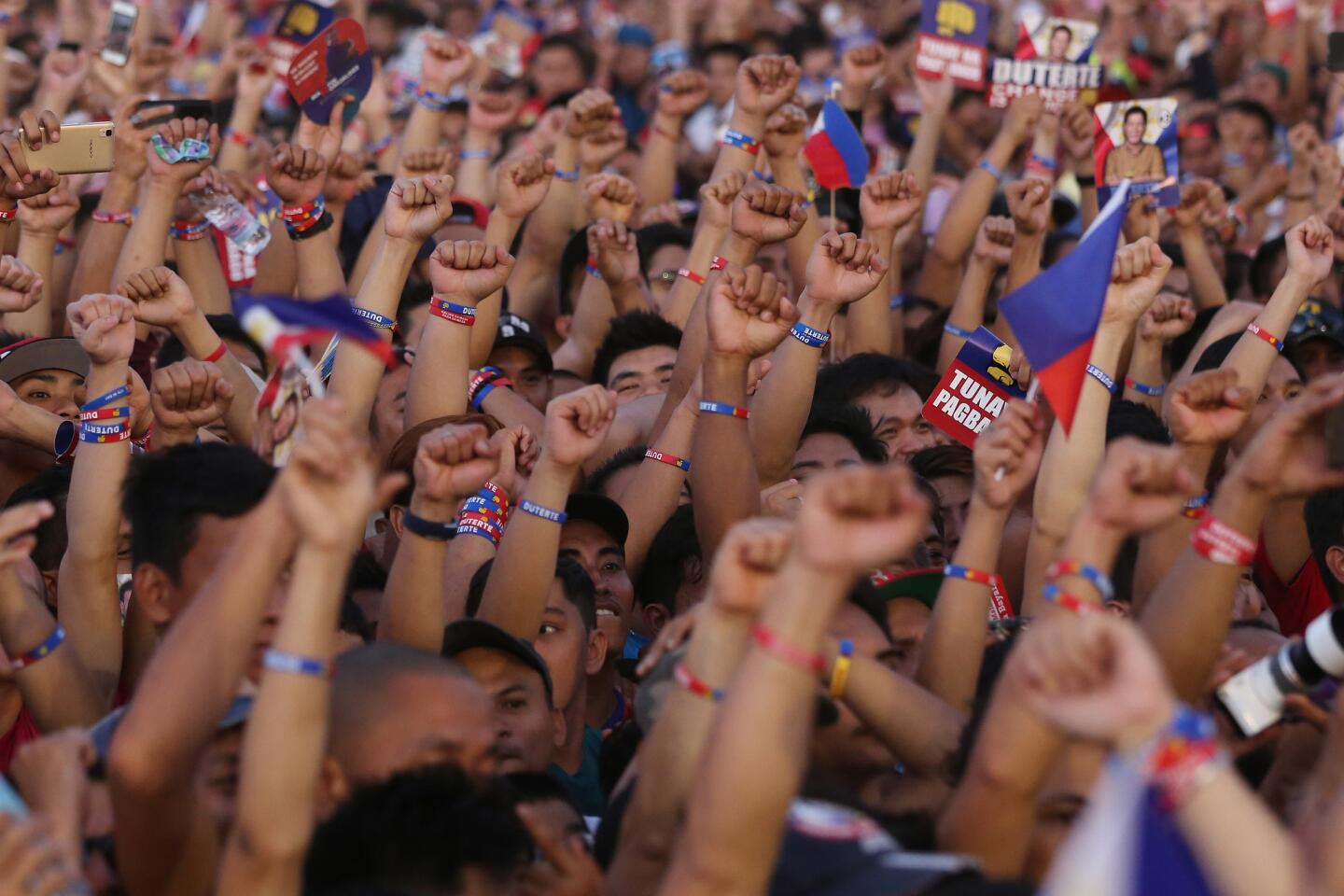As Philippines election nears, front-runner Duterte makes many shudder
- Share via
reporting from Manila — The applause was so loud you could feel its rhythm in your heart.
“Duterte! Duterte!” chanted a crowd of hundreds of thousands packed into Manila’s Luneta Park on a warm, breezy Saturday evening. They waved Filipino flags and held their fists in the air.
The Philippines’ presidential front-runner Rodrigo Duterte, 71, appeared onstage, wearing a red polo shirt and blue jeans. Then, to rapturous applause, he called a senator “stupid,” a competing candidate “a son of a bitch,” and the military “s--t-heads” if they attempt to challenge him.
“We want change!” said Esmat Bayadsid, a 48 year-old tailor from Cotabato City in the country’s deep south. “We want to put an end to all the chaos and disorder.”
The Philippines will elect a new president on Monday, and Duterte’s shocking, profanity-laced campaign has likened him to Donald Trump and rocked the Philippines’ political establishment. In recent months, he has remarked on the size of his penis, called Pope Francis the “son of a whore,” and bragged — with an ambiguous degree of sincerity — about overseeing hundreds of extrajudicial killings during his 22-year tenure as mayor of the southern city Davao.
Moreover, analysts say that Duterte’s rise could undermine the foundations of Philippine democracy. Beyond the bombast, Duterte has shown little respect for the country’s democratic institutions, leading analysts to brand him a dictator in the making. He has warned that he may implement a “revolutionary government” if congress blocks his plans.
If Duterte wins the presidency I will weep for the Philippines. Because it means going back.
— Solita Monsod, professor emerita, University of the Philippines’ School of Economics
“These bleeding heart liberals, they’re only concerned with saving one son of a bitch at a time, while I protect a whole city,” he said at Saturday’s rally.
The latest polls show Duterte leading with 33% of the vote, beating his closest rivals by more than 10%. (In the Philippines, the candidate with the most votes wins). Police estimated at least 300,000 people attended the rally.
Over the past six years, the Philippines’ annual GDP growth rate has averaged above 6 percent, making the country one of the world’s fastest-growing economies. Yet many Filipinos are disillusioned by endemic problems with drugs, crime and corruption, and angry that recent economic gains have not trickled down to the poor. More than 45% of the Philippines’ 101 million people live on less than $2 per day.
“If you show me stats, in black and white, it’s good,” said Miguel Lia, a 35-year old seafarer who traveled three hours to attend the rally. “But if you ask the people, the poor ones, they don’t really feel it – that’s the reality here. Most people don’t feel what the government has to offer.”
Many Filipinos believe that only a powerful leading figure will be able to disrupt the status quo.
“His political will – that’s the most important thing,” Lia continued. “Some congressmen and senators, they just pass laws — that is their job, and it’s good, but if you pass them without implementation it’s nothing, it’s garbage.”
A former state prosecutor, Duterte has burnished a reputation for being tough on crime — so tough, in fact, that he is known for not letting the country’s legal system constrain him. Human Rights Watch has said that he oversaw — or at least condoned — “death squads,” gangs of armed vigilantes who killed more than 1,000 suspected criminals, many of them young and poor. He claims that his city is now one of the country’s safest, a refuge of security in the conflict-ridden southern region of Mindanao.
Although Duterte’s fiery campaign rhetoric has made Donald Trump look tame, it has only seemed to boost his popularity. At a rally last month, he joked about an Australian missionary who was raped and killed during a prison break in 1989. “I was angry because she was raped, that’s one thing,” he said, “But she was so beautiful, the mayor should have been first. What a waste.”
American and Australian ambassadors rebuked Duterte for the comment; he told them to “shut up.”
“Policies don’t necessarily determine who wins, and you get people like Duterte running as strongmen candidates, as [former presidents] Marcos or Estrada did,” said Lynn T. White III, an emeritus professor of politics and international affairs at Princeton University and author of a 2014 book “Philippine Politics: Possibilities and Problems in a Localist Democracy.”
“Or as Andrew Jackson did. Fujimori in Peru,” he continued. “It happens all over the place. Or Thaksin in Thailand. People who get votes for their reputations for violence. That can be very effective in democratic situations — we’ve got a little of that now in the U.S. with Donald Trump.”
Current President Benigno Aquino III has called for a political coalition to defeat Duterte — sort of a homegrown “Never Trump” campaign — and yet his pleas have yet to manifest in any obvious agreement. Neither of the two candidates virtually tied in second place, Grace Poe or Manuel “Mar” Roxas, has agreed to end their campaigns and endorse the other.
Duterte’s detractors have found that their criticisms are often met with torrents of abuse, much of it anonymous.
Manuel Noli Agcaoili, a 75-year-old disability rights advocate, said that he criticized Duterte on a radio show after the mayor spoke at a campaign rally about urging a former classmate, a stroke victim, to kill himself.
“An hour after broadcast I got an untraceable call saying something not nice,” Agcaolili said. “They told me to be careful with what I say. And if I continue I might prematurely leave this world.”
A member of Gabriela, a Manila-based women’s rights group, said that after the group criticized Duterte for his rape comments, it endured an intense cyber-bullying campaign which included a torrent of Facebook spam and attempts to discredit its work.
Supporters say that Duterte is misunderstood, and that his tough campaign rhetoric masks a genuine compassion for disadvantaged groups.
Joe Calida, Duterte’s counsel and friend since the 1970s, said in an interview that the mayor “has empathy for the downtrodden,” and “speaks the language of the masses.” After Taiphoon Haiyan struck the Philippines in November, 2013, killing 6,300 people, he went on an aid mission to the worst-hit areas.
“When he saw the corpses in the streets, actually, he cried,” Calida said. “People think Duterte is all tough, etc., but he has a soft heart for those who are victims.”
He said that Duterte will improve the Philippine economy by focusing on the country’s education system, and that his tough anti-crime measures will create a better environment for foreign investors.
“People look at him as a political savior, so to speak, with decisiveness and political will,” he said. “Davao, if you go there, that is his exhibit A.”
He denied that Duterte believes he is above the law.
“Let me put it this way: when he says ‘I will kill you,” what he means is ‘I will use the full force of the law to punish you,’ OK?” he said. “If the criminal resists and is armed and dangerous, and he fights it out, then he expects the police to kill him. No mercy.”
Red Tani, 33, president of Filipino Freethinkers, an activist group, said that he distrusts Duterte because of his human rights record as mayor. “I believe that if the reports of groups like Human Rights Watch and Amnesty International are to be believed, then he deserves to be thrown in jail, not made president,” he said.
Other critics see in Duterte a hint of the country’s former dictators — when Ferdinand Marcos ruled the country from 1965 to 1986, he declared martial law and tortured his opponents.
“If Duterte wins the presidency I will weep for the Philippines,” said Solita Monsod, a professor emerita at the University of the Philippines’ School of Economics. “Because it means going back. We have done so well in the past six years -- and we will go back to martial law, to everyone being above the law.
“It’s that bad,” she continued. “I am going to weep for the country.”
De Leon is a special correspondent. Staff writer Julie Makinen contributed to this report.
ALSO
Ellen Pao’s next act targets Silicon Valley’s diversity problem
Uber conquered taxis. Now it’s going after everything else
Immigrants in U.S. illegally are given a shot to return to their professions
More to Read
Sign up for Essential California
The most important California stories and recommendations in your inbox every morning.
You may occasionally receive promotional content from the Los Angeles Times.

